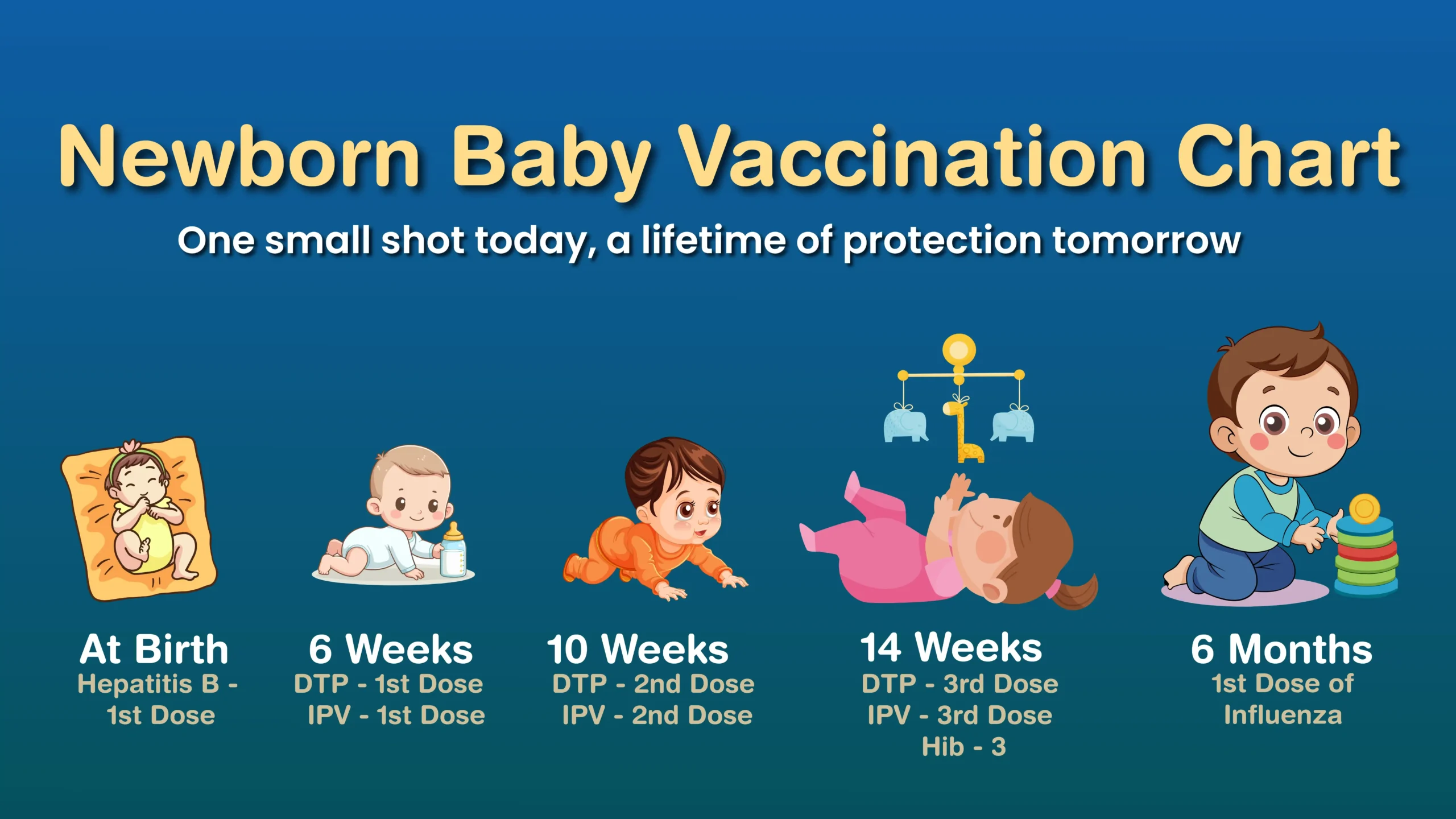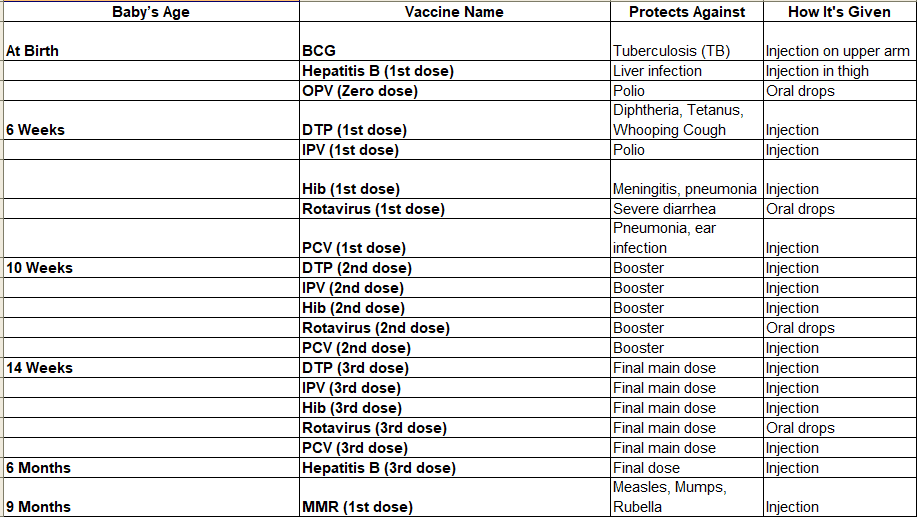
Baby Vaccination Schedule and Child Immunization:
Becoming a parent once in life is the most beautiful and emotional movement and journey of life and when you take your little baby in your arms for the first time, it is a wonderful feeling, your heart is filled with happiness and but you also have a fear that he should never have any problem, you want to do everything right, especially when it comes to their health and child Immunization. This is the first step for your baby, a healthy start in your life and getting them vaccinated on time. Following the Baby Vaccination Schedule helps protect your child from serious diseases right from birth. That’s why it is important to guidance from the best pediatrician.
You must be understanding how important vaccines are for a new born baby for his health and the health of their child is the first priority of parents. He should get the baby vaccinated on time so that he does not suffer from any disease or illness. New parents should know how to protect their child and when to get vaccinated after the child is born and following the baby vaccination schedule ensures your child receives the right vaccines at the right age.
If you are a new parent looking for reliable guidance, consulting a child specialist in Agra can help you understand your baby vaccination schedule and overall health needs and a trusted pediatrician near me will guide you through every step of your baby development.
Why Child Immunization Matter For Newborns Explain
The immune system of these newly born babies is still developing, this means that they are more vulnerable to infections and so that newly born babies do not get sick very soon, it is very important to give them vaccines on time so that they do not get any diseases and remain protected. It is essential to follow baby vaccination schedule. And just as everyone knows that when new parents are born and they have a newly born baby, then while taking care of their baby and looking for reliable guidance and searching for child vaccination near me, they should give them vaccines from time to time when your baby receives the vaccine and a safe amount of virus and bacteria or a piece of it is introduced into their body. Consulting the pediatrician can provide you with the right guidance and help you follow the child vaccination chart to schedule for your child’s vaccination.
It helps the baby’s immune system to recognise and fight any future illness. And because of vaccines, diseases that could have caused serious problems to young children and could have even caused their death are now rare or even eliminated in many parts of the world. By following the baby vaccination schedule And vaccinating your child not only protects them but also helps protect other children and family members by preventing the spread of infectious diseases.

When Does NewBorn Baby Vaccination Begin?
According to the baby vaccination schedule, starts right at birth. In most hospitals the first few vaccines are given within the first 24 hours of life. These early vaccines are essential because they provide immediate protection from some very serious diseases that are common in newborns or can be passed from mother to child during birth.
Baby Vaccination Chart-


Baby Vaccination Schedule (Based on Indian and WHO Guidelines)
The baby vaccination schedule provides a clear timeline of essential vaccines your child should receive during the first two years of life. These are based on common schedules followed in India and recommended by the World Health Organization (WHO).
- At the time of birth, all three important vaccines must be given to the baby- BCG vaccine, the first dose of Hepatitis B vaccine, and OPV. These are best given before the baby is discharged from the hospital.
- At six weeks, your baby will have his first doses of DTP (Diphtheria, Tetanus, and Pertussis), IPV (Inactivated Polio Vaccine), Hib (Haemophilus influenzae type B), Rotavirus, and the PCV (Pneumococcal Conjugate Vaccine) that help protect your baby from various diseases ranging from whooping cough, pneumonia, and severe diarrheas.
- Repeat the same set of vaccines at ten weeks to strengthen immunity. It is much more important to get two booster shots at fourteen weeks that complete the series and provide full protection. So never skip the boosters.
As per the Vaccination chart for babies in India Following this, your little one would have already had his Hepatitis B first and second doses and would be waiting for his third dose of Hepatitis B at six months. Under nine months, you can treat this baby to the first dose of the MMR vaccine that protects your baby against measles, mumps, and rubella. At this age, Typhoid Conjugate Vaccine can also be recommended. Between 12 and 15 months, booster doses of MMR, Hib, and PCV will be given to maintain immunity. Between 16 and 24 months, your baby will.
Understand the First Child Vaccination
A new wave of uncertainty creeps in when you have to think about those first shots for your baby, usually lots within twenty-four hours after its birth. So if you can later just learn what a vaccine acts against and why it is important, your worries could be less. Referring to the Baby vaccination schedule can help you stay informed about your Child immunization.
- The BCG vaccine offers protection to your baby from tuberculosis. TB is a serious infection that usually attacks the lungs but may also affect the brain and other parts of the body. The injection is given in small doses into the clap of the right or left upper arm. Later, it could develop into a small scar, which is perfectly fine, as this actually indicates the vaccine has done its job.
- Hepatitis B vaccine offers protection against a virus that damages the liver. More important if the mother has the virus, this is generally recommended for all babies. It is given as an injection in the baby’s thigh.
- The oral polio vaccine is given dropwise in the mouth. It is fast, painless, and it builds protection against the polio virus, which if not arrested could cause permanent paralysis.
- For all these very first vaccines, safety is the main issue. Occasionally, a baby can develop a mild fever, a little swelling at the injection site, or become a bit fussy. The side effects are mild, and they usually go away within a day or two.
What to Do During and After Vaccination?
Watching your baby getting a shot is nerve-wracking, especially for the first time. But following the baby vaccination schedule and Holding your baby close, staying calm, and speaking to them in a gentle voice may distract your little one from the discomfort. Feeding after a vaccine commonly offers a soothing effect.
Right after child immunization it’s normal for your little one to feel little sleepy or a bit fussy for a little. Some babies tend to have slight swelling or redness around the site of injection. Sometimes mild fever also comes along. A small dose of infant paracetamol may be required if your child is feeling really uneasy Consult your doctor before giving any medication. Afterward, just concentrate on nourishing him and keeping him comfortable. Should the fever last longer than two days or in the case of any unusual symptoms, such as crawling rashes or endless crying, go straight ahead and call your doctor.

What If a Vaccine Dose Is Missed?
Missing vaccine appointments often occurs in the first months of life while the child is being cared for. The good news is that most vaccines can still be given later and you do not have to start all over. Your doctor will help you catch up and re-adjust the timeline based on baby vaccination schedule.
Keeping yourself organized helps you stay in line. Keep a vaccination record or use a mobile app to remind you about upcoming doses. Sometimes, hospitals may also send out reminders.
Is It Safe for Vaccines for Your Baby?
Child immunization is a safe and essential part of keeping your baby are safe & healthy. Before any vaccine is given to children, it is tested for years upon years to ensure that it is effective and does not do any harm. Post-approval, a lot of other experts keep testing the vaccine to ensure that it remains safe for usage. The baby vaccination schedule help parents follow a trusted schedule. Millions of babies get vaccinated every year all over the world without any form of complications. Serious side effects are very rare. Annually, millions of babies take these vaccines worldwide without a single problem reported, and serious side effects are so infrequent they are almost unheard of. Keep in mind, though, that diseases that vaccines shield people from, such as measles, polio, and tuberculosis, are far more dangerous than the few mild side effects a vaccine may bring on. They can cause severe health problems and even the death of an unfortunate soul. Vaccines hold off on this and save lives.
Conclusion: Give Your Baby the Best Start
As a parent, keeping your baby safe is your foremost goal. Your baby’s safety comes first as a parent. Vaccines are among the best defense systems you can offer to protect your child against many serious diseases. It becomes really hard to watch the baby go through a needle, but each shot is a step toward the baby’s being healthy and strong. Stick to the schedule given, listen to your doctor, and ask any questions that come to your mind if you do not understand something. You are the biggest protector of your baby. Keeping your baby vaccinated is giving him or her a good start in life.





